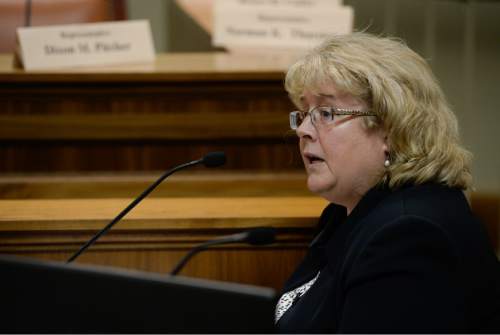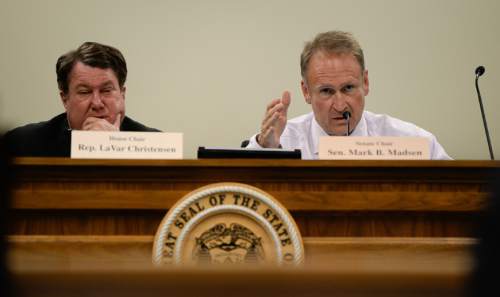This is an archived article that was published on sltrib.com in 2015, and information in the article may be outdated. It is provided only for personal research purposes and may not be reprinted.
For the first time in years, Utah lawmakers are debating the merits of the death penalty, with some conservative Republican legislators questioning whether the cost and risk of executing innocent people argued for doing away with executions in the state.
''I'd pull the switch if I knew the person was guilty, and I have no problem with an eye for an eye,'' said Sen. Mark Madsen, R-Saratoga Springs. ''But it is not a conservative value to have blind, slavish faith in government and to assume that they'll always get it right just because they have a badge or work in the prosecutor's office and we've invested them with a lot of authority.''
Members of the Legislature's Judiciary Interim Committee heard from a pair of legislators in Nebraska about why that state recently abolished capital punishment, and critics of the death penalty who said the cost is exorbitant and the risk of executing innocent people is very real.
Madsen, the committee chairman, described his own evolution on the issue, to the point where he would support following the lead of legislatures in other states and do away with the death penalty.
Other states are already moving in that direction.
Last week, Ohio Gov. John Kasich granted a reprieve to inmates scheduled for execution in 2016, since the state has been unable to obtain the drugs used in lethal injections.
The attorney general in Oklahoma announced a one-year moratorium on executions after it was found the state used the wrong drug in its most recent case.
Earlier this month, a judge in Montana blocked executions in that state for the same reason.
And the Nebraska Legislature repealed the death penalty earlier this year, but a petition drive seeking to reverse the move has blocked the repeal from taking effect until after the 2016 election.
Nebraska Republican Sen. Brett Lindstrom told the committee by phone that he supported the death penalty a year ago, but botched executions in other states and concerns about the cost and false convictions led him to a change of heart.
"It just wasn't something that was working all that well in the state of Nebraska," he said.
Earlier this year, a divided U.S. Supreme Court upheld the use of particular drugs in lethal injections. The court has already heard one death-penalty challenge in Kansas earlier this month and is scheduled to hear a Florida challenge later this term.
Supreme Court Justice Antonin Scalia said the court has made it "practically impossible to impose [the death penalty], but we have not formally held it to be unconstitutional," and that "it wouldn't surprise me" if the death penalty was done away with by the court.
The prospects for such a major shift among Utah's conservative Legislature are unclear, and neither Madsen nor any other Utah lawmaker is currently sponsoring a bill to end the death penalty.
"I don't think Utahns think that much about the death penalty because it hardly ever happens in our state, but when it does, it's a horrific thing," said Rep. Steve Handy, R-Layton. But he acknowledged polls continue to show public support for the practice. "I don't see — and I'm going to say, unfortunately — too much of an appetite to ban the death penalty."
Handy cited figures he had prepared by legislative analysts in 2012 that showed executing a hypothetical 25-year-old convict would cost the state $1.6 million more than it would cost to incarcerate the same inmate for the rest of his or her life. And the state, at that time, spent $1.75 million a year handling death-row appeals.
More compelling to several lawmakers, was the risk of wrongly executing an inmate.
Jensie Anderson from the Rocky Mountain Innocence Project said there are estimates that 4 percent of those on death row in the United States are innocent. Since 1973, there have been 156 death-row convicts who have been exonerated — one exoneration for every nine inmates put to death.
"The problem is the system gets it wrong," she said.
While there is not an ironclad case of an innocent person being executed, she said there are 11 cases where groups have categorized the case as "very questionable."
She suggested legislators impose a moratorium on executions in the state so they can collect data and study the issue and make an informed decision on whether to continue with capital punishment.
But some, like Rep. Dixon Pitcher, R-Ogden, has no problem with continuing the current course.
He and Handy knew Carol Naisbitt and her son Cortney, who were shot in the back of the head during the Ogden Hi-Fi murders in 1974. Carol was killed and Cortney lived with debilitating injuries until he died in 2002.
Their killers, Pierre Dale Selby and William Andrews, were executed in 1987 and 1992, respectively.
Pitcher said he trusts the checks in place in the justice system to get it right and would be "opposed to taking [the death penalty] off the table."
Utah's last execution came in 2010 when Ronnie Lee Gardner was killed by firing squad for murdering a bartender and later shooting a lawyer to death and wounding a bailiff during an escape attempt.
At the time, Utah was the only state to use the firing squad, and the case drew international attention and condemnation. In 2004, Utah did away with the firing squad, except for those inmates who had already chosen the method of execution.
But earlier this year, the Legislature restored the firing squad as an option in case the state is unable to get the drugs used in lethal injection executions — a problem that has arisen in several other states.
House Minority Leader Brian King, D-Salt Lake City, said the process of going through an execution itself is detrimental to society.
"It's not the high road that I think we as a state and we as a country should be on, and the existence of the death penalty for me is a very coarsening thing," King said.
Twitter: @RobertGehrke
The Associated Press contributed to this report





